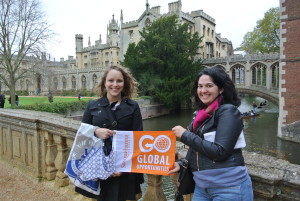Adjusting to Life Abroad
Culture Shock
Many students take the comforts of home for granted before they leave to study abroad. Consider how often you hop in your car to drive to a grocery store to pick up all of the food you need for that week. It is likely you won’t even be in a car at all during your study abroad experience, and even less likely you’ll have one at your disposal for grocery shopping! Although this may seem like a silly example, it certainly speaks to the differences between life in the States and life living abroad. Many study abroad students will experience culture shock while living abroad, although most won’t believe it until it happens. Culture shock is most often defined by a series of reactions to living within a culture that is not your own.
Symptoms of culture shock might include:
- Homesickness
- Depression
- Anxiety
- Stress
- Confusion
- Tiredness
- Resentment of host culture
Typically, culture shock is experienced in four phases, although this can change for everyone, and some people may not experience all of them. These are the four traditional phases:
- The “Honeymoon” Phase. This is when you’ve first arrived to your host country, and you’re in awe of nearly everything you see. Everything seems very new and exciting, and you’re anticipating all of the fantastic experiences you’re sure to have. At this point, you’ll probably still have a very idealistic view of your host culture and city.
- The Crisis Phase. During the crisis, you’re starting to realize how different your host culture is from your home culture, and you might be a little resentful of that. This can be especially challenging in a country where you don’t speak the language, as you may be frustrated that no one understands you or your culture. You may also be very tired from your first week or two of exploring, and this may lead to frustration that things are no longer so easy to get excited about.
- The Adjustment Phase. You may still be a little tired and resentful of your host culture, but you’re coping. You’ve finally been able to establish a routine and have been able to make friends. You might be getting a better handle of the language and the layout of your new city, and you’re finding new activities that you enjoy. This phase is most definitely an improvement on the Crisis Phase, and you’re more than likely enjoying living abroad!
- The Resolution Phase. This final phase may or may not occur for you, as different students adjust differently. In the resolution phase, you’ve accepted your host city as your new and/or current home, and you’re happy about it! You feel very confident speaking in the host language, and the host mannerisms may be becoming reflexive. This phase is more likely to occur if you’re abroad for a full academic year or longer.
Because every student is different, you may experience all of these, none of these, or ones that aren’t even listed! Regardless of the type of culture shock you experience, there are a few things that you can do to help you adjust to your new home more quickly:
- Establish a routine quickly. Decide when and how you’ll get to class, when and where you go to lunch, when and where you go grocery shopping, which buses to take, etc. Figuring out your routine early will give you a sense of security when you become frustrated or anxious.
- Make friends! This may seem obvious, and it may also seem harder than it looks. The advantage you have as a study abroad student is that it is likely that your peers will also be study abroad students, and they’ll need friends too. Additionally, you all have something in common- you’re studying abroad! Don’t commit to a week-long holiday for Spring Break with your new friends just yet, but certainly get a group together for lunch or coffee to try to establish relationships. These are people that you’ll have memories with for the rest of your life, and you’ll want to get to know them early! If someone invites you to do something, always go the first time you’re asked no matter how tired you are. If you say no, it might be that you won’t get invited again, but if you go the first time, you can always say you’re too tired the second.
- Write a blog or a journal about your experiences. This will help you in two ways: it will allow you to process your thoughts and reactions as you’re having them, and it will give you something to look back on when you get home and you’re really missing that time you were horse-back riding in a mountain in Italy. This will also allow you to keep friends and family updated without having to constantly Skype them, as you can just pass along your blog’s URL and mass-update. Everyone at home will want to know how you’re getting on, but spending too much time talking to them will actually make your home sickness worse, and it will prevent you from making those crucial friends abroad.
If you’re having problems with home sickness or culture shock while you’re abroad, and can’t seem to overcome it, please speak to a staff member at your host institution. Almost all study abroad programs will have someone whose job it is to handle student problems and questions, and this person will be well-equipped to help you. If you don’t know who this person is or you don’t feel comfortable speaking to them, try speaking to one of your professors. Someone at your host institution will be there to help you if you need it. Additionally, if you run into problems with homesickness, your parents will more than likely be very upset because they’re not there to help you. You should certainly keep them updated on how you’re feeling, but be aware that they’re probably worried about your well-being. Try speaking to your new friends, as they’re probably going through a lot of the same feelings that you are, and you may be able to help each other.
A group of study abroad friends and I experiencing Florence from above, Spring 2011
Get the Most Out of Your Experience
When you first go abroad it seems as if you have an infinite amount of time on your hands to explore your new city, to travel to new places, to eat amazing food, and do everything else that you want to do before you go home. Unfortunately, this simply isn’t true. If you’re lucky you’ll have a year, but most students have between 3 and 4 months to see and do all they want while they’re abroad. You definitely want to be sure to use all of the time that you do have to your advantage. Try follow these tips to get the most out of your study abroad experience, you’ll appreciate it when you’re back at your home university day-dreaming about all of the amazing things you’ve seen and done!
- Try to see, do, or experience at least one new thing every week (or day if you’re ambitious!)
- Spend several weekends in your actual host city instead of traveling every weekend- you’ll actually get to know the place you’re living, and you’ll appreciate those memories more than anything!
- Keep a journal detailing everything you experience, think, and feel while you’re abroad. It’s amazing to go back to this journal once you’re home to experience it all over again.
- Take photos! Studying abroad is not the time to forget your camera or rush through an experience so that you don’t have time to capture it on film. You’ll want those photos to share with family and friends back home, and you’ll love looking back at them when you’re home.
- Speaking of photos- don’t spend all of your time abroad looking through a camera. While taking photos is definitely important, also remember to be in the moment so that you truly experience everything for yourself. Photos are good reminders and are great to have, but nothing beats the memories you’ll make while you’re abroad.
- Make local friends- nothing will immerse you in your host culture faster than experiencing it alongside people who live it everyday. It can be difficult to make local friends, but the benefits far outweigh the struggle to get there.
At the top of Mt. St. Victoire near Aix-en-Provence in 2011- the first time I studied abroad
A friend and I in Cambridge with our alma mater’s study abroad flag in 2013



